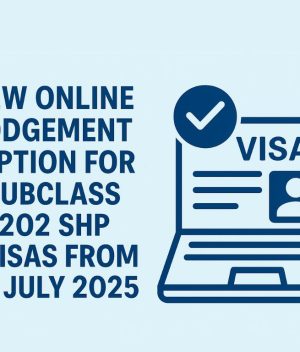Migration (Public Interest Criterion 4022) – 2025 Update
Migration (Public Interest Criterion 4022 – Code of Behaviour) Instrument 2025
The Australian immigration framework frequently undergoes updates to ensure clarity, fairness, and compliance with public interest. One such recent update is the Migration (Public Interest Criterion 4022 – Code of Behaviour) Instrument 2025 (LIN 25/017), issued by the Minister for Immigration and Multicultural Affairs. This instrument replaces the previous Code of Behaviour (LIN 24/031) and ensures the seamless continuation of its requirements beyond 31 March 2025, when the former instrument was set to expire.
Who Does Changes to Bridging Visa E Apply To?
The Code of Behaviour applies to applicants for a Subclass 050 Bridging (General) visa who meet the following criteria:
- They are at least 18 years old at the time of application.
- They currently hold or previously held a Bridging E (Class WE) visa granted under section 195A of the Migration Act 1958 (which allows discretionary visa grants by the Minister for Immigration).
This Code is specifically designed for Bridging E visa holders released from immigration detention, ensuring they comply with behavioural standards set by Australian law.
Key Provisions of the Instrument
The instrument contains several important provisions to maintain clarity and continuity in visa regulations:
1. Legal Framework & Commencement
- The instrument is issued under clause 4.1 of Schedule 4 of the Migration Regulations 1994.
- It formally replaces and repeals LIN 24/031, ensuring that the Code of Behaviour remains in force beyond March 2025.
2. Code of Behaviour Requirements
- Schedule 1 of the instrument outlines the approved Code of Behaviour for visa applicants.
- The Code sets expectations regarding conduct, compliance with Australian laws, and respectful behaviour within the community.
3. Legislative Continuity
- Schedule 2 repeals the previous instrument (LIN 24/031) and ensures uninterrupted enforcement of the behavioural requirements.
Impact & Consultation Process
- The new instrument does not introduce any substantive changes but simply extends the existing Code of Behaviour.
- The Office of Impact Analysis (OIA) looked at the instrument. They decided that no more impact analysis was needed (OIA reference: OIA25-09231).
- No external consultation was undertaken, as the instrument only continues established rules without modifications.
- The instrument is not subject to parliamentary disallowance under section 42 of the Legislation Act 2003. This means it will stay in effect without needing more approval.
Why Is This Important for Bridging E Visa Holders?
The Code of Behaviour is a critical component of the Subclass 050 Bridging Visa application process. Visa holders must comply with its requirements to maintain their visa status and avoid potential visa cancellations. This ensures:
- Adherence to Australian laws and community standards.
- Respectful behaviour towards authorities, service providers, and the public.
- No engagement in criminal activities or disruptive conduct.
Failing to follow the Code of Behaviour can cancel your visa, refusal of future visa applications, and lead to possible removal from Australia.
Final Thoughts
Further Migration (Public Interest Criterion 4022 – Code of Behaviour) Instrument 2025 maintains the current behavior standards. This applies to Subclass 050 Bridging Visa holders.
Therefore this ensures they act responsibly while living in Australia. The update primarily serves to extend current provisions without changes, maintaining regulatory clarity and consistency.
Moreover, If you are a Bridging Visa E applicant or have this visa, it is important to understand the Code of Behaviour. This will help you stay compliant and avoid legal issues. Stay informed and ensure you meet all visa requirements to secure your stay in Australia.
Need Immigration Assistance?
If you have concerns about your visa status or compliance with Australian migration laws, Emigrate Lawyers can help. Our experienced team specializes in Bridging Visas, Migration Appeals, and Visa Compliance Issues. Contact us today for expert legal advice.
Disclaimer:





